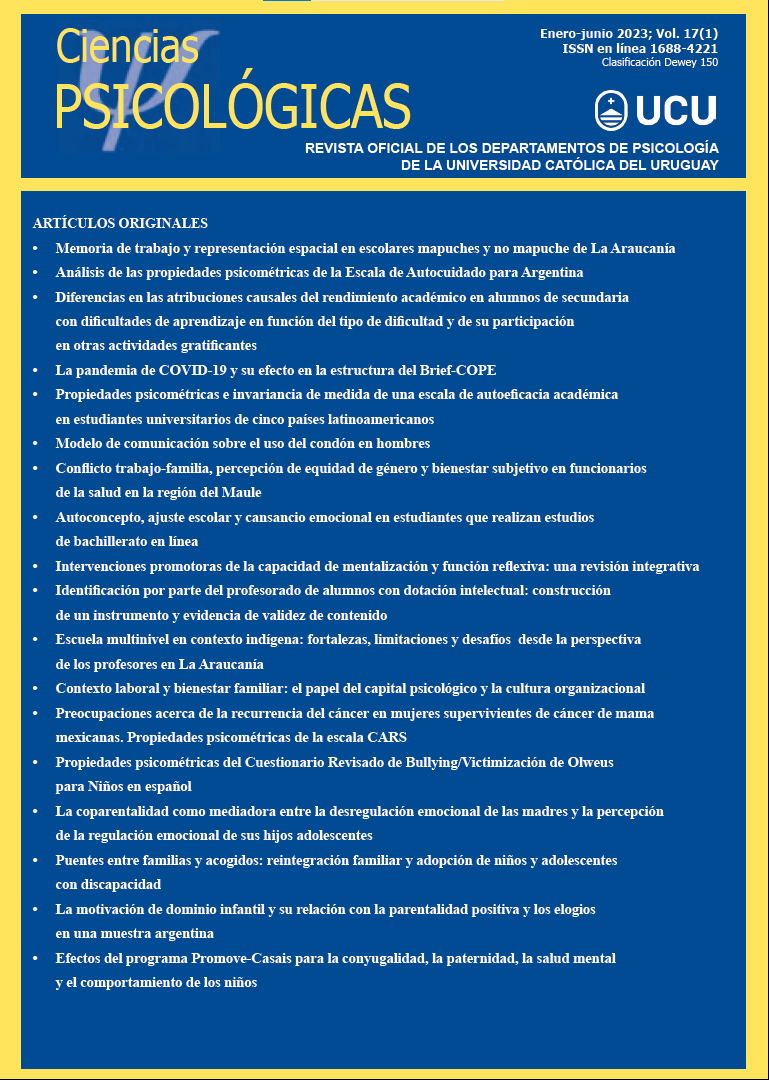La pandemia de COVID-19 y su efecto en la estructura del Brief-COPE
DOI:
https://doi.org/10.22235/cp.v17i1.2476Palabras clave:
pandemia, COVID-19, afrontamiento, instrumento, análisis factorialResumen
El presente estudio tuvo como objetivo investigar la estructura dimensional de Brief-COPE durante la pandemia de COVID-19. Seiscientos sesenta y seis adultos de todas las regiones de Brasil participaron en esta investigación, en su mayoría mujeres (77 %), con edades entre 18 y 79 años (M = 36.70; DE = 13.12). Los participantes respondieron preguntas sociodemográficas y el Brief-COPE. Se realizaron análisis descriptivos y análisis factoriales confirmatorios. Se confirmó la estructura dimensional de primer orden, con 14 factores. La estructura de segundo orden no convergió y se propuso una nueva estructura de segundo orden basada en la correlación entre los factores de primer orden. El nuevo modelo propuesto presentó índices adecuados de ajuste a los datos. Estos resultados sugieren que la pandemia puede haber cambiado la forma en que los participantes perciben y relacionan las estrategias de afrontamiento.
Descargas
Citas
Baumstarck, K., Alessandrini, M., Hamidou, Z., Auquier, P., Leroy, T., & Boyer, L. (2017). Assessment of coping: a new french four-factor structure of the brief COPE inventory. Health Qual Life Outcomes, (15), 8. https://doi.org/10.1186/s12955-016-0581-9
Brown, T. A. (2015). Confirmatory factor analysis for applied research. The Guilford Press.
Carver, C. S. (1997). You want to measure coping but your protocol’s too long: consider the brief COPE. International Journal of Behavioral Medicine, 4(1), 92-100. https://doi.org/10.1207/s15327558ijbm0401_6
Carver, C. S., Scheier, M. F., & Weintraub, J. K. (1989) Assessing coping strategies: a theoretically based approach. Journal of Personality and Social Psychology, (56), 267-283. https://doi.org/10.1.1.333.4970
Cheung, G. W. & Rensvold, R. B. (2002). Evaluating goodness-of-fit indexes for testing measurement invariance. Structural Equation Modeling: A Multidisciplinary Journal, 9(2), 233-255. http://doi.org/10.1207/s15328007sem0902_5
Chun, C.-A., Moos, R. H., & Cronkite, R. C. (2006). Culture: A Fundamental Context for the Stress and Coping Paradigm. In: P. T. P. Wong & L. C. J. Wong (Eds.), Handbook of Multicultural Perspectives on Stress and Coping (pp. 29-53). Springer.
Dawson, D. & Golijani-Moghaddam, N. (2020). COVID-19: Psychological flexibility, coping, mental health, and wellbeing in the UK during the pandemic. Journal of Contextual Behavioral Science, (17), 126-134. https://doi.org/10.1016/j.jcbs.2020.07.010
Dubey, S., Biswas, P., Ghosh, R., Chatterjee, S., Dubey, M. J., Chatterjee, S., Lahiri, D., & Lavie, C. J. (2020). Psychosocial impact of COVID-19. Diabetes & Metabolic Syndrome: Clinical Research & Reviews, (14), 779-788. https://doi.org/10.1016/j.dsx.2020.05.035
Garcia, L. P. & Sanchez, Z. M. (2020). Consumo de álcool durante a pandemia da COVID-19: uma reflexão necessária para o enfrentamento da situação. Cadernos de Saúde Pública, 36(10), e00124520. https://doi.org/10.1590/0102-311X00124520
Harrington, D. (2009). Confirmatory factor analysis. Oxford University Press.
Konaszewski, K., Niesiobędzka, M., & Kolemba, M. (2019). Social and personal resources and adaptive and non-adaptive strategies for coping with stress in a group of socially maladjusted youths. European Journal of Criminology, 19(2), 183–201. https://doi.org/10.1177/1477370819895977
Maroco, J., Campos, J. B., Bonafé, F. S., Vinagre, M. G., & Pais-Ribeiro, J. (2014). Adaptação transcultural Brasil-Portugal da Escala Brief-COPE para estudantes do ensino superior. Psicologia, Saúde & Doenças, 15(2), 300-313.
Muthén, L. K. & Muthén, B. O. (2014). Mplus user’s guide (7th ed.). Muthén & Muthén.
Naseem, Z. & Khalid, R. (2010). Positive thinking in coping with stress and health outcomes: literature review. Journal of Research and Reflections in Education, 4(1), 42-61.
Pollard, M. S., Tucker, J. S., & Green Jr., H. D. (2020). Changes in adult alcohol use and consequences during the COVID-19 pandemic in the US. JAMA Network Open, 3(9), e2022942. https://doi.org/10.1001/jamanetworkopen.2020.22942
R Development Core Team. (2015). R: A language and environment for statistical computing. https://cran.r-project.org/doc/manuals/fullrefman.pdf
Roussel, Y. (2012). Lavaan: An R Package for Structural Equation Modeling. Journal of Statistical Software, 48(2), 1-36. https://doi.org/10.18637/jss.v048.i02
Sousa, A. R., Santana, T. S., Moreira, W. C., Sousa, A. F. L., Carvalho, E. S. S., & Craveiro, I. (2020). Emoções e estratégias de coping de homens à pandemia da COVID-19 no Brasil. Texto & Contexto Enfermagem, (29), e20200248. https://doi.org/10.1590/1980-265X-TCE-2020-0248
Thompson, R. J., Mata, J., Jaeggi, S. M., Buschkuehl, M., Jonides, J., & Gotlib, I. H. (2010). Maladaptive Coping, Adaptive Coping, and Depressive Symptoms: Variations across Age and Depressive State. Behavioral Research Therapy, 48(6), 459-466. https://doi.org/10.1016/j.brat.2010.01.007.
United Nations. (2020, May 13). United Nations Policy brief: COVID-19 and the need for action on mental health. United Nations Sustainable Development Group. https://unsdg.un.org/sites/default/files/2020-05/UN-Policy-Brief-COVID-19-and-mental-health.pdf
World Health Organization. (2020, March 18). Mental health and psychosocial considerations during the COVID-19 outbreak. https://www.who.int/docs/default-source/coronaviruse/mental-health-considerations.pdf?sfvrsn=6d3578af_2
Descargas
Publicado
Cómo citar
Número
Sección
Licencia
Derechos de autor 2023 Universidad Católica del Uruguay

Esta obra está bajo una licencia internacional Creative Commons Atribución 4.0.
















